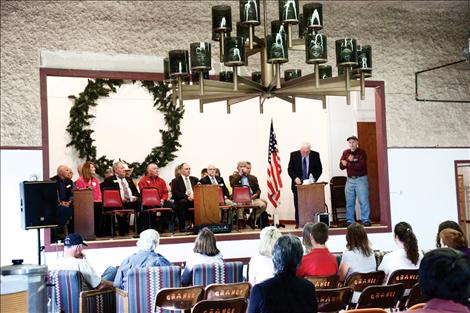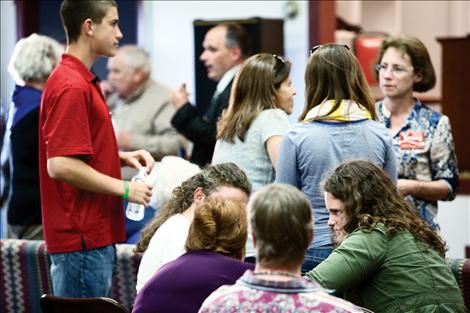Candidates participate in Grange forum
Hey savvy news reader! Thanks for choosing local.
You are now reading
1 of 3 free articles.
RONAN — The weight of several uncontested primaries drove many people to listen to more than a dozen candidates who turned out for a last minute political forum held by the Round Butte Grange 126 last Friday.
Most of the candidates that participated were part of races where no one had filed in the opposing party, with winners decided in Tuesday night’s primary after the Valley Journal went to press.
Sharon Sampson, of Polson, said the importance of the primary election was one of the reasons she came out to listen to what was said.
“So many of them are going to be in office after the primary,” Sampson said. “Sometimes you think you’ve got your mind made up but after you listen to them it can change your mind completely.”
Bonnie Mueller of Ronan said she wanted to be informed when she headed to the polls on Tuesday.
“I just wanted to know more about the candidates,” Mueller said. “I want to be an informed voter because if you don’t vote you can’t complain.”
Moderator Gehrand Beehard said that the crowd’s dedication to learning more about their representatives was encouraging.
“I think this is probably the best representation of rural America that I’ve ever seen,” Beehard said.
While most of the races discussed at the forum have already concluded, a handful of contenders will go on to the November general election.
House District 93
Competitors for House District 93 had a lively exchange about the state of healthcare, environmental regulations, and resource development. Three of the four candidates for the office participated.
Republican Incumbent Dan Salomon called for increased compromise in the state’s handling of Medicaid expansion. The proposal for expansion came late in the last legislative session and had too many kinks to pass, Salomon said. The governor’s office has also vetoed tort and Medicaid reform measures that would make the programs more solvent, Salomon said. Progress on expansion can be made, but only if both parties come to the table ready to compromise, Salomon said.
Republican challenger Frank Delgado shared a similar viewpoint saying that the Affordable Care Act is cumbersome.
“Is the healthcare going to run us, or are we going to run the healthcare?” Delgado asked.
Democratic challenger Susan Evans disagreed with her fellow candidates, saying that the issue boils down to protecting the lives of people and that there are too many who are currently without care.
Evans was also at odds with her Republican opponents about development of natural resources in the state. Evans said that she believes regulations are made to protect people. She was horrified by the conditions in which her son worked in the Bakken oilfields of North Dakota.
“It’s human nature to get away with the most that (companies) can get way with,” Evans said.
She clarified that environmental protection does have reasonable boundaries that shouldn’t be crossed. It makes no sense for entire forests to go to waste because of zealous environmentalists, Evans said.
“We need to act within reason,” Evans said, adding that it should be “criminal not to log” in some cases.
Delgado and Salomon were in agreement that tough environmental regulation is hindering business in the state.
“They don’t call Montana the treasure state for nothing,” Delgado said of the state’s natural resources. “We just need to get environmentalists to back down a little bit.”
Salomon said that most of the hang-up occurs in federal regulations the state has little say over. He lamented that entire forests near Helena have died because environmental groups have prevented management.
“We’ve lost our lumber industry,” Salomon said.
Senate District 8
Liane Johnson is the sole Republican contender for Senate District 8. She is running against Lynn Stanley who did not attend the forum.
Johnson said that she has a lot of experience working with the healthcare system, and that the rollout of the Affordable Care Act was geared toward cities and not frontier hospitals. She said some modifications are going to have to be done if rural hospitals are to survive the transition into the new law’s requirements.
“Our hospitals are going to be in extreme trouble,” Johnson said.
Johnson also is concerned about how environmental regulations are hindering business.
“When we created the EPA we created a monster with no common sense,” Johnson said. She believes the federal agency should be done away with.
Justice of the Peace
Questions submitted for Incumbent Judge Joey Jayne and challenger Randal Owens asked little more of the candidates than to give their qualifications for office and their ideas of what role a justice of the peace plays in the justice system.
Jayne introduced herself as a longtime attorney who has also served as a state legislator. Jayne said that she has enjoyed the responsibility of interpreting the law in her term as judge. She said that Lake County Justice Court has the seventh or eighth highest number of cases in the state, which means she has learned to juggle her caseload.
“Sometimes you don’t have a whole lot of time to do a whole lot of research,” Jayne said.
Opponent Owens told the crowd about two decades of service for the Montana Highway Patrol, with all but one spent in Lake County.
“I’m not an attorney, but I do know a lot about the law,” Owens said.
If elected, Owens said he would be fair and impartial.
“I’ve seen many courts,” Owens said. “I know what can work in court.”
District Judge
Incumbent Judge Jim Manley and challenger Mark Russell were also tossed a light load of questions that basically asked for their qualifications and perceived role in the courts.
Manley introduced himself as a longtime local attorney. Manley was appointed judge in 2013 after the retirement of C.B. McNeil.
The biggest challenge facing the district court is the increased number of drug cases, Manley said.
“By and far, methamphetamine is the scourge of Lake County,” Manley said.
He’s enthusiastic about one young attorney’s recent work to get a separate drug court established in Lake County.
Manley said he is also worried about the increased politicization of judicial elections, especially in the Montana Supreme Court.
For the first time out-of-area special interests are making major contributions to the campaigns of judicial candidates, Manley said.
Challenger and chief Lake County Deputy Attorney Mark Russell echoed Manley’s concerns about the drug problem that subsequently spurs smaller epidemics of lesser crimes. Russell said repeat drinking and driving offenders are also a major problem in the area. The issue is of special interest to Russell, who lost his brother in a 1988 drunken driving incident.
He said he realizes there is little a district court judge can do until a fourth offense constitutes a felony charge, but that he wishes the legislature would crack down on penalties so judges could do more.
Public Service Commission
Two Kalispell candidates vying in the three-man race for Republican nominee for the Public Service Commission introduced themselves at the forum. The winner will go on to face Democratic state Rep. Gale Hollenbaugh of Helena in the primary.
The commission is a quasi-judicial body tasked with overseeing the state’s utilities. Railroad regulation and natural gas pipeline safety rules are also under the purview of the commission.
Former legislator Derek Skees touted his experience and relationship with current commission leadership and explained how carbon taxes are driving up the sales cost of dams in Montana.
Challenger John Campbell postured himself as a polar opposite of Skees who said that the 573-page document generated by the commission in recent dam sales “would make pretty good toilet paper.”

















